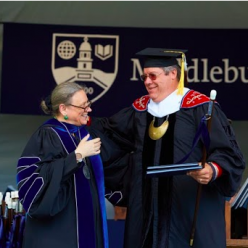By Erin Dahl ‘24.5 & Zelda Mayer ‘24.5
On September 11th, 2013, twelve years after the devastating terror attacks on New York’s World Trade Center, student activists at Middlebury College uprooted a 2,977 American flag memorial from the lawn of Mead Chapel in protest (Despart). The direct action was spurred by a visiting guest, Amanda Lickers—a member of the Haudenosaunee Confederacy, not of the Abenaki—who was “informed that the College was the site of an Abenaki burial ground” during a workshop that day (Singer). Lickers, in attempted solidarity with the Abenaki, decided to take action with two Middlebury students by vandalizing the 9/11 memorial, whose large display of American iconography (flags) was seen as offensive to the history of the land (Singer). Although the protest was well-intentioned—Anna Shireman-Grabowski, a contributing protestor wrote in a responding testimony, “colonialism has been—and continues to be—a real and destructive force in the world that we live in. And for me, to honor life is to support those who struggle against it,”—it resulted in extreme negative backlash towards the Abenaki community (Singer).
Represented in this conflict is the threatening consequence of uninformed (and arguably performative) activism that dangerously decenters directly-affected voices, moving away action from the authentic interests of the particular community, thus misrepresenting and undermining their voices. Unfortunately, Indigenous communities have faced manifestations of uninformed activism many times. Chief Don Stevens of the Nulhegan Band of the Abenaki Nation responded to the incident saying: “We didn’t know anything about this and if we had we certainly wouldn’t have sanctioned it,” (Picard). Stevens expressed frustration with the false information presented in the protest as well, explaining that Abenaki burial grounds are not sites of public knowledge, nor would it be disrespectful to memorialize victims of the attack on that land if so (Singer). Because the action attempted to speak on behalf of the Abenaki (without informed consent or approval), the backlash garnered from the protest was unfairly directed towards Stevens and his tribe. This resulted in Stevens receiving “death threats for months for his perceived involvement in the students’ protest,” an outcome that points to a greater issue within contemporary activist culture with historical implications (Picard).
The United States has always aimed to quantify, characterize, and report on the realities and experiences of Indigenous peoples, a practice that enforces a troublingly non-Native narrative of history, past and present. This persistent throughline strips agency away from those authentically experiencing a reality, replacing informed, intentional and personally political information and action with a harmful paternalistic dynamic. This tendency has led to the actions displayed in the 9/11 protest; the protest mirroring a centuries-long desire to report on, and more contemporarily, speak on behalf of Indigenous interests. Again in 2017, a non-Abenaki activist defaced the “Everyone Loves a Parade!” mural in Burlington, VT stating that it “obliterates First Nation peoples’ lives and history.” To this, Stevens responded saying the Abenaki do not need anyone to speak on their behalf (Picard).
Moving forward, those who want to enact impactful change for groups outside of one’s own must actively seek out information, testimony, and approval from those directly represented. While many may feel moved to organize and act on issues outside of their own experience, Linda Tuhiwai offers the project perspective of Representing to better inform activist work. Representing addresses the struggle of self-representation that Indigenous communities have faced since colonization through the intentional exclusion of Native voices from political decision-making. Smith notes that “States and governments have long made decisions hostile to the interests of indigenious communities, justifying these by offering the paternalistic view that indigneous peoples were like children who needed others to protect them and decide what was in their best interests” (151-152). The project of Representing aims to combat the paternalism that historically has affected decisions made on issues that impact Indigenous peoples—a necessary framework for addressing the misguided action of Amanda Lickers, Anna Shireman-Grabowski, and the other non-Abenaki protestors.
Before engaging in direct-action, it is crucial to differentiate between acting on behalf of an affected group or acting in conscious solidarity. The repercussions of paternalistic action are evident in the unmerited retaliation aimed at the Abenaki tribe after the 9/11 protest. Continuing on, the structure given through Representing asks for a deliberate centering of Native voices in organizing around issues that specifically affect Indigenous communities.
Further Reading
Mni Wiconi: Water is Life: The Power of Social Media in Contemporary Indigenous Resistance
Works Cited
Despart, Zach.“9/11 Flag Vandalism Shocks Middlebury College.” Addison County Independent, 15 Sept. 2013, https://addisonindependent.com/911-flag-vandalism-shocks-middlebury-college-0.
Picard, Ken. “Seven Days Article.” Seven Days, 26 Feb. 2020, https://middlebury.instructure.com/courses/7974/assignments/117188?module_item_id=439992.
Singer, Emily. “Abenaki Denounce 9/11 Flag Memorial Vandalism.” The Middlebury Campus, 18 Sept. 2013, https://middleburycampus.com/21639/news/abenaki-denounce-911-flag-memorial-vandalism/.
Smith, Linda Tuhiwai. Decolonizing Methodologies: Research and Indigenous Peoples. 2nd ed., Zed Books, 2012.

